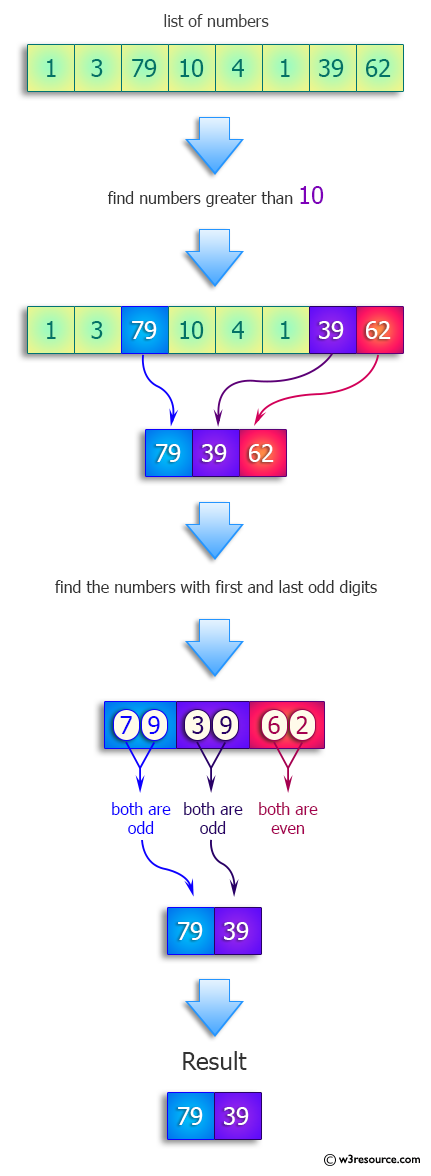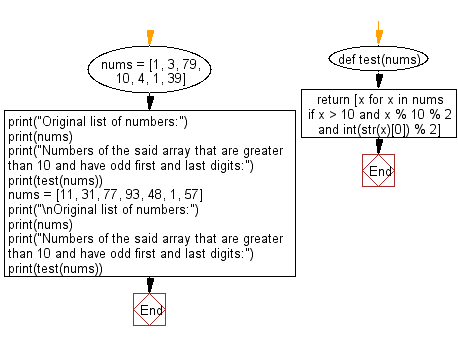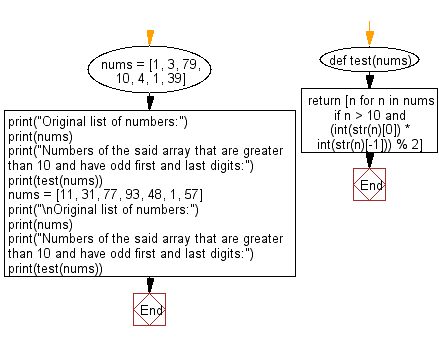Python: Find the numbers that are greater than 10 and have odd first and last digits
Odd First and Last Digits
Write a Python program to find numbers that are greater than 10 and have odd first and last digits.
Input: [1, 3, 79, 10, 4, 1, 39, 62] Output: [79, 39] Input: [11, 31, 77, 93, 48, 1, 57] Output: [11, 31, 77, 93, 57]
Visual Presentation:

Sample Solution-1:
Python Code:
# Define a function named 'test' that takes a list of numbers as input
# The function filters numbers greater than 10 with odd first and last digits
def test(nums):
# Use a list comprehension to filter numbers based on specified conditions
return [x for x in nums if x > 10 and x % 10 % 2 and int(str(x)[0]) % 2]
# Create a list of numbers named 'nums'
nums = [1, 3, 79, 10, 4, 1, 39]
# Print a message indicating the task and the original list of numbers
print("Original list of numbers:")
# Print the original list of numbers
print(nums)
# Print a message indicating the task and the result of the test function applied to 'nums'
print("Numbers of the said array that are greater than 10 and have odd first and last digits:")
# Print the result of the test function applied to 'nums'
print(test(nums))
# Create another list of numbers named 'nums'
nums = [11, 31, 77, 93, 48, 1, 57]
# Print a message indicating the task and the original list of numbers
print("\nOriginal list of numbers:")
# Print the original list of numbers
print(nums)
# Print a message indicating the task and the result of the test function applied to 'nums'
print("Numbers of the said array that are greater than 10 and have odd first and last digits:")
# Print the result of the test function applied to 'nums'
print(test(nums))
Sample Output:
Original list of numbers: [1, 3, 79, 10, 4, 1, 39] Numbers of the said array that are greater than 10 and have odd first and last digits: [79, 39] Original list of numbers: [11, 31, 77, 93, 48, 1, 57] Numbers of the said array that are greater than 10 and have odd first and last digits: [11, 31, 77, 93, 57]
Flowchart:

Sample Solution-2:
Python Code:
# Define a function named 'test' that takes a list of numbers as input
# The function filters numbers greater than 10 with the product of their first and last digits being odd
def test(nums):
# Use a list comprehension to filter numbers based on specified conditions
return [n for n in nums if n > 10 and (int(str(n)[0]) * int(str(n)[-1])) % 2]
# Create a list of numbers named 'nums'
nums = [1, 3, 79, 10, 4, 1, 39]
# Print a message indicating the task and the original list of numbers
print("Original list of numbers:")
# Print the original list of numbers
print(nums)
# Print a message indicating the task and the result of the test function applied to 'nums'
print("Numbers of the said array that are greater than 10 and have odd first and last digits:")
# Print the result of the test function applied to 'nums'
print(test(nums))
# Create another list of numbers named 'nums'
nums = [11, 31, 77, 93, 48, 1, 57]
# Print a message indicating the task and the original list of numbers
print("\nOriginal list of numbers:")
# Print the original list of numbers
print(nums)
# Print a message indicating the task and the result of the test function applied to 'nums'
print("Numbers of the said array that are greater than 10 and have odd first and last digits:")
# Print the result of the test function applied to 'nums'
print(test(nums))
Sample Output:
Original list of numbers: [1, 3, 79, 10, 4, 1, 39] Numbers of the said array that are greater than 10 and have odd first and last digits: [79, 39] Original list of numbers: [11, 31, 77, 93, 48, 1, 57] Numbers of the said array that are greater than 10 and have odd first and last digits: [11, 31, 77, 93, 57]
Flowchart:

For more Practice: Solve these Related Problems:
- Write a Python program to filter a list for numbers greater than 10 whose first and last digits are odd by converting numbers to strings.
- Write a Python program to check each number’s first and last digits using arithmetic operations (integer division and modulo).
- Write a Python program to use recursion to verify that a number’s first and last digit are odd, then filter the list accordingly.
- Write a Python program to return all numbers satisfying the condition and output them in sorted order.
Go to:
Previous: Remove duplicates from a list of integers, preserving order.
Next: Find an integer exponent x such that a^x = n.
Python Code Editor :
Have another way to solve this solution? Contribute your code (and comments) through Disqus.
What is the difficulty level of this exercise?
Test your Programming skills with w3resource's quiz.
